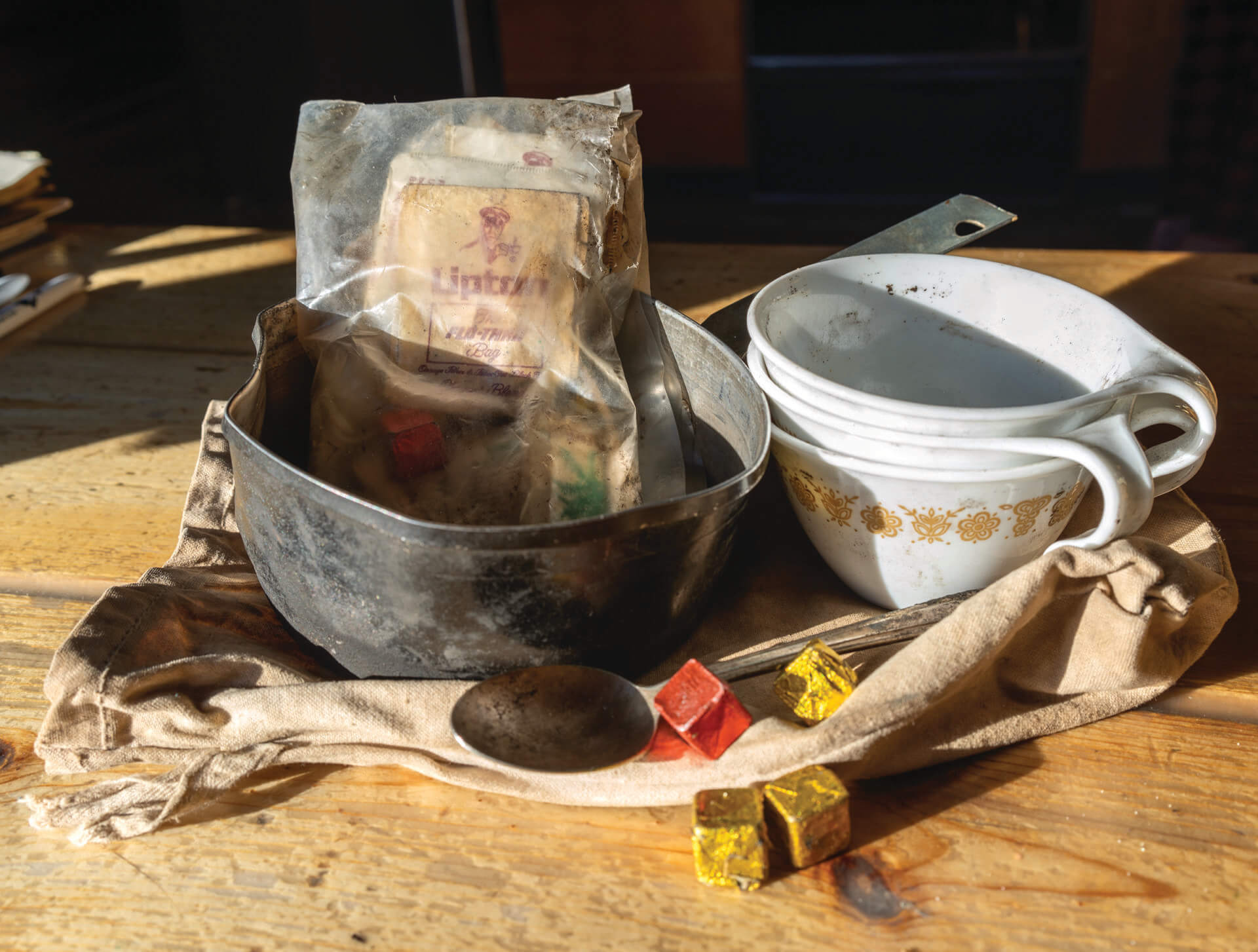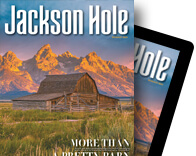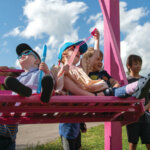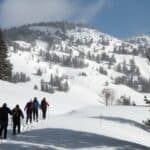Read The
Current Issue
Gap Pucci
The ‘last of the old cowboys’ chronicles his life of adventure in three books.
// By Jim Stanford

Dressed in a maroon button-down shirt, kerchief, and sheepskin vest, he tosses forkfuls of hay into a corral beside his cabin, tucked into a draw by the Camp Creek elk feed ground. One wall is adorned with horseshoes he fashioned with a forge and anvil, while the inside teems with stuffed wildlife mounts, bear hides, firearms, old leather saddles, and horse tack.
He may not have been on the Lewis and Clark expedition, but Gap Pucci seems to have stepped out of the pages of mountain man history from a hundred years ago. As a hunting and pack-trip outfitter, he ranged through the most remote parts of the Gros Ventre Wilderness for four-plus decades, guiding clients in pursuit of elk, deer, bears, and bighorn sheep. He has been knocked down by a bear; nearly drowned in creek crossings; been bruised and broken by falls on horseback; and survived blizzards, landslides, and earthquakes. He has a five-inch plate in his neck from an equestrian wreck: “Not one time, it was too many times!” he says.
His given name is Gaspari Puccio, the same as his father and grandfather; it’s Americanized into Casper Puche or Pucci. “Gap” is a common Italian nickname for Gaspari.
All of this was highly unlikely for a child of Sicilian immigrants raised near Philadelphia. His given name is Gaspari Puccio, the same as his father and grandfather; it’s Americanized into Casper Puche or Pucci. “Gap” is a common Italian nickname for Gaspari. A former bodybuilder who once had Olympic dreams, he served in the Army and went to Penn State for a year to become a farrier. After sheepherding and roaming parts of the West in the late 1960s, he came to Jackson Hole to work on Don “Doc” MacLeod’s Granite Ranch and then ran Granite Hot Springs for 25 years, mostly living in a cabin with no electricity or running water. He later moved to Camp Creek and started Crystal Creek Outfitters. Now retired and approaching 89 years old, he recently finished his third book, Jackson’s Hole Horse and Family Adventures, due out this year.
Because a conversation with Gap is like the proverbial drinking from a firehose, with enough information and anecdotes to fill an entire magazine, this interview has been edited for brevity.
Q: How did serving in the Army prepare you for Wyoming?
GP: I was part of a Cold War strike unit in Point Barrow, Alaska, during the 1950s. It was a bad time. We lived in a bunker and were on duty 24 hours a day. It was dark all winter. It got down to 62 below. I learned a lot about survival. When I left Alaska, I said, “I’ll never say it’s cold again.”
Q: What was it like living up Granite Creek all those years? Was it as idyllic as it sounds, or was the reality harsher?
GP: You got to remember I was young. It was an adventure. That’s why we live here—the adventure. That’s what I came for, and I sure I got it!
Q: What are three things every adventurer should carry into the wilderness?
GP: By all means, carry fire. If you get lost, build the biggest damn fire you could, and stay put. I did that lots of times. Two, some sort of medication, at least aspirin, and something to stop bleeding. A neckerchief can be used for a tourniquet. Three, knowledge—let somebody know where you’re going.
Q: Throughout your outfitting career, you relied on Morgan horses. What distinguishes the breed?
GP: They’re the most powerful. They’ve got the most endurance and have a good brain. When you’re in snow up to your chest, you’ve got to have a good horse busting trail. No wonder they still use the term “horsepower!” A good mountain horse, they’ll save your life over and over.
Q: What advice do you have for someone new to hunting preparing for their first elk hunt?
GP: Be quiet. Ever notice the size of their ears? We’re talking wilderness elk—they know you’re there. Know your rifle well, and listen to your guide. Practice following crows in your scope. You should be able to put a sparrow in the crosshairs. So often I’d have clients coughing, sneezing, talking, tromping on pine cones. I’d say, “If those elk could shoot back, you’d be dead.”
Q: You’ve devoted a good part of your life to storytelling, oral and written. Did you study English?
GP: I barely got through school. I didn’t learn a damn thing. Teachers pushed me through because I played sports. I was there for lunch and sports.
Q: You do all your writing by hand, with a stack of thick yellow legal pads and pens collected from the bank. Is it a difficult process?
GP: I start writing on the mail, or toilet paper. Then I do an outline on the legal pads. The stories are coming out from my head to my heart and soul, to my arm and hand. You’re getting all the emotion down to the pen.
Q: You’ve written, “Most bears are peaceful unless provoked or harassed.” One of your closest calls on a hunt was being knocked down by a wounded bear. What’s it like to come face to face with one?
GP: They are so quick and powerful. They’re defiant. And they’ve got a nose and ears like radar. That bear on the defensive, he can hurt you. But if it’s wounded, you’ve got to follow it as long as you can. You have a responsibility if you shoot at an animal. You can’t leave him out there where he might hurt somebody else, like a hiker who comes along the next day.
Q: Some of your early friends and mentors were Doc MacLeod, Mardy Murie, and Neil Rafferty. What did you learn from Mardy Murie?
GP: She was really inspirational in my life. She was a preservationist but also an outdoorswoman and tough as nails. When they lived in Alaska, she and her husband, Olaus, subsisted on caribou meat.
Q: Religion is a big part of your life. You’ve spent so much time in the wilderness and had many intense experiences—was it spiritual?
GP: God was all around you. I had a lot of close calls, living like this. If life gets hard enough, you’ll learn to pray. I appreciate a beautiful sunrise, a beautiful sunset, a three-foot Engelmann spruce tree, all the wildlife. That’s part of that peace. You don’t have to be any particular denomination to feel the tranquility.
Q: Many of your stories about people are punctuated by “They’re all dead now.” What can the young people of today learn from your generation?
GP: I notice they get down pretty quick. They give up too quick. Never quit. Don’t be a quitter. Never give up. Persevere.

Survival Kit
On his well-worn “mountain saddle,” outfitter Gap Pucci estimates he rode 45,000 miles up and down some of the most rugged terrain in the Gros Ventre Wilderness. His high camp was at 9,000 feet at the base of Crystal Peak, a 17-mile ride from base camp with seven creek crossings. He always carried with him a small essayer’s bag (“You’ve seen them in all the Westerns,” he says) with a few pieces of gear more valuable than gold in case of an unplanned night out, including a lighter, propane, waterproof matches, or Sterno ethanol gel; and a two-cup pot with cups, tea bags, and/or chicken bouillon stashed inside a plastic bag. “If you get out there in a bad storm, you can get a fire started. Make a big fire, as big as a pickup truck,” he says. With that and hot drinks, “You’ll be very comfortable that night, or two. You feel so much more comfortable when you’re prepared, not panicky. It doesn’t weigh anything. If you’re guiding, the clients feel good thinking, ‘This guy knows what he’s doing.’”
Gap’s Griddle Cakes
Eating well at camp is a must for high-country adventures. This recipe Gap’s godfather brought back from World War II, and Gap stole it from his mother. He calls these pancakes a “wholesome” crowd pleaser. “They’re real stuff. You can’t stop eating them.”
Ingredients
2 cups flour
2 tbsp sugar
3/4 tsp salt
3 tsp baking powder
2 eggs
1 1/2 cups milk
1/4 cup oil, melted shortening, or margarine
Mix all ingredients well and ladle into a heated, greased skillet. Flip when bubbles appear in the batter. (Serves 4) JH




